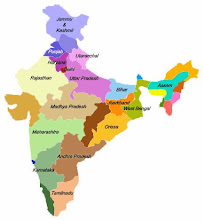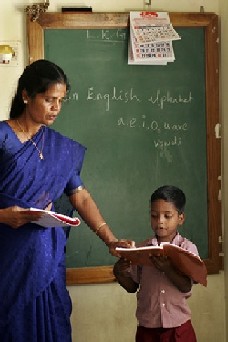
The fish man delivers. Twice each week he brings ocean fish in a gunny sack on his motor bike, scales them, cleans them, and cuts them up for our kitchen staff.

Washing the family buffalo. Some farmers use oxen and some use water buffaloes for their work. Interestingly, buffalo milk is preferred over cow's milk (6% milkfat - so delicious, but oh so laden with calories). Village farmers provide buffalo milk to Rising Star twice daily, obtained from animals purchased through our microcredit program.

Vickie visited an historical cemetery across the road from the Walajabad leprosy colony. These are graves of British colonials who died in one of India's recurring cholera epidemics. We can only imagine what is was like to pack up a family and move from England to India in the days of primitive medicine. Time to read "The Secret Garden" again?

Vickie teaching a leprosy patient to care for himself. Our medical outreach team instituted a program to help the leprosy-affected take more responsibility for their own care. Vickie has become indispensable to Rising Star medical; they are wondering what they will do when she leaves.

Vickie and I on the steps of the tank of a large Hindu temple. The tanks are used for ritual washing on holy days. This one even has a few fishies in it.

Village day laborers plant rice in the Rising Star paddies. For some reason rice planting is always done by women; they just tuck up their sarees and off they go. We also raise chili peppers, tomatoes, lady finger (okra), bottle gourd, and watermelon, along with coconuts, mangoes, and bananas. Our older students are learning to plant, irrigate, cultivate, and harvest for our use and for sale to local vegetable shops.

Rising Star's older girls help by stripping leaves to be used in the next day's meals. Greenleaf is used in most of the vegetable dishes served by our cooks.

Workers use natural materials to build housing for the workers who will construct our school addition, kitchen/dining hall, and hostel. Big contractors often import labor from other states because they are more likely to stay on the job instead of going home each day and forgetting to return to work. The workers will live here for about a year.

Vickie lays a foundation brick at the
pooja (Hindu blessing ceremony) for the groundbreaking of the new school addition. Our contractors happen to be Christian but they honor the beliefs and traditions of their predominantly Hindu workers. It was a wonderful start to the this much needed project.


































